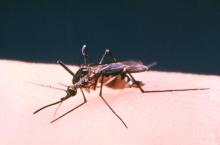Eastern Equine Encephalitis: About
Eastern equine encephalitis is a rare but severe illness spread by the bite of an infected mosquito. In Wisconsin, it is likely spread by a few different types of mosquitoes.
Most Eastern equine encephalitis cases in the U.S. occur in the Atlantic and Gulf Coast states. Only five human cases of Eastern equine encephalitis have been reported in Wisconsin from 1964 to 2020, but four of those five cases have occurred since 2011.
Anyone can get Eastern equine encephalitis, but people who spend more time outdoors are at a higher risk of being bitten by an infected mosquito. Mosquitoes are usually most active in Wisconsin from May to September, but risk of Eastern equine encephalitis is highest during late summer and early fall.
Mosquitoes can be found in areas with standing water, which they need to breed. It is important to remove standing water sources, such as containers, leaves, and yard debris, to reduce breeding habitats in your yard. For more tips, visit our Mosquito Bite Prevention page.
Eastern equine encephalitis is preventable. Visit our Mosquito Bite Prevention page to learn how to protect yourself from illnesses spread by mosquitoes.
In Wisconsin, Eastern equine encephalitis is spread to humans through the bite of an infected mosquito
- Mosquitoes become infected with Eastern equine encephalitis by feeding on infected birds.
- After feeding on a bird that has Eastern equine encephalitis, the virus may end up inside of the mosquito.
- Once it is infected with the virus, a mosquito may spread the virus to other birds or mammals, including humans, when they take another blood meal.
- Horses can become sick from infected mosquitoes, but the virus does not spread between horses, from horses to people, or between people.
- Mosquitoes are usually most active in Wisconsin during the warmer summer months and into the fall.
- Few mosquitoes actually carry the virus, but it is important to take prevention measures when spending time outside.
Eastern equine encephalitis is preventable. Visit our Mosquito Bite Prevention page to learn how to prevent mosquito bites.
Symptoms can show up four to 10 days after being bitten by an infected mosquito
Some people infected with Eastern equine encephalitis virus never develop symptoms. Those who do become sick may develop a mild flu-like illness, and others may develop an encephalitic infection (an infection that involves swelling of the brain). The severity of illness usually depends on the age of the person and if they have underlying health problems. Eastern equine encephalitis can be very severe, and even fatal, especially in those older than 50 and younger than 15. About one-third of people who develop severe illness will die, and those who recover often have mild to severe brain damage. If you have had Eastern equine encephalitis virus, you cannot get it again.
Mild signs and symptoms
- Fever
- Chills
- Muscle aches
- Joint pain
- Malaise
Encephalitic infection signs and symptoms
- Fever
- Headache
- Irritability
- Restlessness
- Drowsiness
- Loss of appetite
- Vomiting
- Diarrhea
- Bluish discoloration of the skin
- Convulsions
- Coma
There is currently no treatment or vaccine for Eastern equine encephalitis. Over-the-counter pain relievers may be given to relieve symptoms.
In severe cases, patients may need to be hospitalized to receive supportive treatment. If you believe you or a family member may have Eastern equine encephalitis, contact your doctor immediately.
Department of Health Services resources
Protecting Your Family From Mosquitoes and Ticks, P-02080 (PDF): A fact sheet with simple steps you can take to protect yourself from mosquitoes.
CDC (Centers for Disease Control and Prevention) resources
Mosquito Bites Are Bad (PDF): An educational activity book for kids about preventing illnesses spread by mosquitoes.
Partner resources
- Midwest Center of Excellence for Vector-Borne Disease Mosquitoes: Information on mosquitoes you may find in the Midwest and prevention resources.
- Wisconsin Mosquitoes and Mosquito-Borne Diseases: Information on mosquitoes and diseases they spread from our partners at the University of Wisconsin-Madison Medical Entomology Laboratory.
Questions about illnesses spread by mosquitoes? Contact us!
Phone: 608-267-9003 | Fax: 608-261-4976


